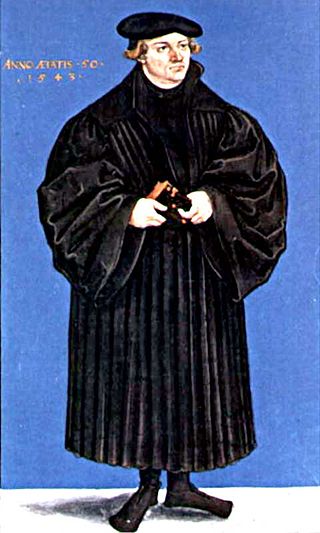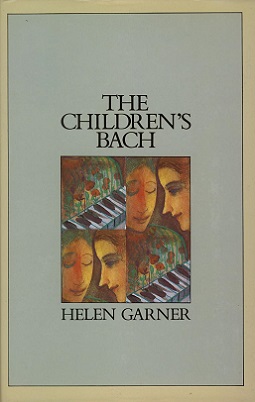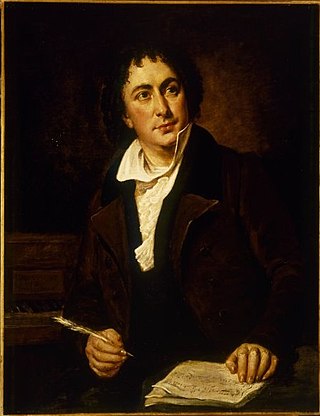Related Research Articles

"A Mighty Fortress Is Our God" is one of the best known hymns by the Protestant Reformer Martin Luther, a prolific hymnwriter. Luther wrote the words and composed the hymn tune between 1527 and 1529. It has been translated into English at least seventy times and also into many other languages. The words are mostly original, although the first line paraphrases that of Psalm 46.

Justus Jonas, the Elder, or simply Justus Jonas, was a German Lutheran theologian and reformer. He was a Jurist, Professor and Hymn writer. He is best known for his translations of the writings of Martin Luther and Philipp Melanchthon. He accompanied Martin Luther in his final moments.

Lyndal Anne Roper is a historian. She was born in Melbourne, Australia. She works on German history of the sixteenth to eighteenth centuries, and has written a biography of Martin Luther. Her research centres on gender and the Reformation, witchcraft, and visual culture. In 2011 she was appointed to Regius Chair of History at the University of Oxford, the first woman and first Australian to hold this position.

Christiana Mariana von Ziegler was a German poet and writer. She is best known for the texts of nine cantatas, which Johann Sebastian Bach composed after Easter in 1725.
Andrew Schultz is an acclaimed Australian classical composer. A musician with a large and widely performed output and an international sphere of activity he has, since 2008, lived in Sydney, New South Wales. He studied at the Universities of Queensland and Pennsylvania and at King's College London and he has received many awards, prizes and fellowships including a Fulbright Award (1982), the Albert H. Maggs Composition Award (1985), Grand-Prix, Opera Screen de Opéra-Bastille (1991), the APRA Award for Classical Composition of the Year (1993), the Schueler Award (2007), the Paul Lowin Prize (2009) and the Centenary of Canberra Symphony Commission (2012). He holds a Bachelor of Music (Hons), Master of Music, and Doctor of Philosophy in musical composition.
Barry Hill is an Australian historian, writer, and academic.

The Children's Bach (1984) is a novella by Australian writer Helen Garner. It was her third published book and her second novel. It was well received critically both in Australia and abroad.

"Ach Gott, vom Himmel sieh darein" is a Lutheran chorale of 1524, with words written by Martin Luther paraphrasing Psalm 12. It was published as one of eight songs in 1524 in the first Lutheran hymnal, the Achtliederbuch, which contained four songs by Luther, three by Speratus, and one by Justus Jonas. It was contained in 1524 in the Erfurt Enchiridion. It is part of many hymnals, also in translations. The text inspired vocal and organ music by composers such as Heinrich Schütz, who set it as part of his Becker Psalter, and Johann Sebastian Bach, who based a chorale cantata on it. Mozart used one of its tunes in his opera The Magic Flute.

"Aus tiefer Not schrei ich zu dir", originally "Aus tieffer not schrey ich zu dir", later also "Aus tiefer Noth schrei' ich zu dir", is a Lutheran hymn of 1524. Its lyrics were written by Martin Luther as a paraphrase of Psalm 130. It was first published in 1524 as one of eight songs in the first Lutheran hymnal, the Achtliederbuch, which contained four songs by Luther, three by Paul Speratus, and one by Justus Jonas, and also appeared the same year in the Erfurt Enchiridion. It is part of many hymnals, also in translations. The text inspired vocal and organ music from the Renaissance to contemporary, including composers such as Johann Sebastian Bach, who based a chorale cantata on it, Felix Mendelssohn and Max Reger.
The Choir of Trinity College, at Trinity College within the University of Melbourne, is a collegiate chapel choir modelled on the choirs at Cambridge and Oxford universities. The choir consists of 27 choral scholars. Under the supervision of the director of music, the choir and organ scholars provide music for regular services of Anglican worship in the college chapel as well as a schedule of public concert performances and recordings for ABC Classics.

Katherine Hoover was an American composer of Contemporary classical music and Chamber music, flutist, teacher of Musical composition and Music theory, poet, and later a conductor of her music. Her career as a composer began when few women composers earned recognition in Classical music in the 1970s. As shown in her list of known works, she has composed pieces for solo flute, mixed ensembles, chamber orchestra, choir, full orchestra, and many other combinations of instruments and voice. Some of her flute pieces incorporated Native American themes.
Penelope Mary Thwaites is a concert pianist and composer, recording artist and editor. Born in the United Kingdom of Australian parents, she is a citizen of both countries. Thwaites is best-known for her interpretations of the music of Australian composers, particularly Percy Grainger.
There are 52 chorale cantatas by Johann Sebastian Bach surviving in at least one complete version. Around 40 of these were composed during his second year as Thomaskantor in Leipzig, which started after Trinity Sunday 4 June 1724, and form the backbone of his chorale cantata cycle. The eldest known cantata by Bach, an early version of Christ lag in Todes Banden, BWV 4, presumably written in 1707, was a chorale cantata. The last chorale cantata he wrote in his second year in Leipzig was Wie schön leuchtet der Morgenstern, BWV 1, first performed on Palm Sunday, 25 March 1725. In the ten years after that he wrote at least a dozen further chorale cantatas and other cantatas that were added to his chorale cantata cycle.

Julianne Schultz FAHA is an Australian academic, media manager, author and editor. She was the founding editor of the Australian literary and current affairs journal Griffith Review. She is currently a professor at Griffith University's Centre for Social and Cultural Research.

Jost Andreas Loewe is an Australian priest in the Anglican Church of Australia. He has served as the 15th Dean of Melbourne since 2012, the second-youngest dean in the history of the diocese.

Australian classical music has developed from early years in the Australian colonies, until today. Today, each state has an orchestra and there are many major venues where classical music is performed.
Johann Sebastian Bach's chorale cantata cycle is the year-cycle of church cantatas he started composing in Leipzig from the first Sunday after Trinity in 1724. It followed the cantata cycle he had composed from his appointment as Thomaskantor after Trinity in 1723.
The Australian Art Orchestra (AAO) is one of Australia's leading contemporary ensembles. Founded by pianist Paul Grabowsky in 1994, it has been led by composer/trumpeter/sound artist Peter Knight since 2013 and led by pianist/composer/producer Aaron Choulai since 2023. The Orchestra explores relationships between musical disciplines and cultures, imagining new musical concepts that reference how 21st century Australia responds to its cultural and musical history.

Ruby Claudia Emily Davy was an Australian pianist, composer and educator. She was the first woman in Australia to receive a DMus degree.
Church music during the Reformation developed during the Protestant Reformation in two schools of thought, the regulative and normative principles of worship, based on reformers John Calvin and Martin Luther. They derived their concepts in response to the Catholic church music, which they found distracting and too ornate. Both principles also pursued use of the native tongue, either alongside or in place of liturgical Latin.
References
- ↑ "Katherine Firth Profile" . Retrieved 30 August 2023.
- 1 2 "Katherine Firth CV". 18 December 2013. Retrieved 18 June 2018.
- ↑ "Represented Artist: Michael Leighton Jones" . Retrieved 18 June 2018.
- ↑ "Peter Campbell" . Retrieved 18 June 2018.
- ↑ "Work: Andrew Schultz, Southern Cantata, op. 102" . Retrieved 18 June 2018.
- ↑ "3MBS Reflections 4 February 2018" . Retrieved 18 June 2018.
- ↑ "World Premiere for Musical Tribute to "unsung" Hero of Penicillin" . Retrieved 18 June 2018.
- ↑ "Work: Michael Leighton Jones, Anthem for the Feast of Any Healer". YouTube . 19 April 2018. Retrieved 18 June 2018.
- ↑ "ABC Encounter: Dr Katherine Firth". Australian Broadcasting Corporation . Retrieved 18 June 2018.
- ↑ Martin Luther and the Arts: Music, Images, and Drama to Promote the Reformation. Brill. 21 November 2022. ISBN 978-90-04-52743-0 . Retrieved 30 August 2023.
- ↑ Johann Sebastian Bach's St John Passion (BWV 245): A Theological Commentary With a new Study Translation by Katherine Firth and a Preface by N. T. Wright. Brill. 3 April 2014. ISBN 978-90-04-27236-1 . Retrieved 18 June 2018.
- ↑ "Project MUSE - Martin Luther's "Mighty Fortress"" . Retrieved 18 June 2018.
- ↑ "Andreas Loewe and Katherine Firth on Bach" . Retrieved 18 June 2018.
- ↑ "Norman Curry Award for Innovation and Excellence in Educational Programs" . Retrieved 18 June 2018.
- ↑ "How to Fix your Academic Writing Trouble" . Retrieved 18 June 2018.